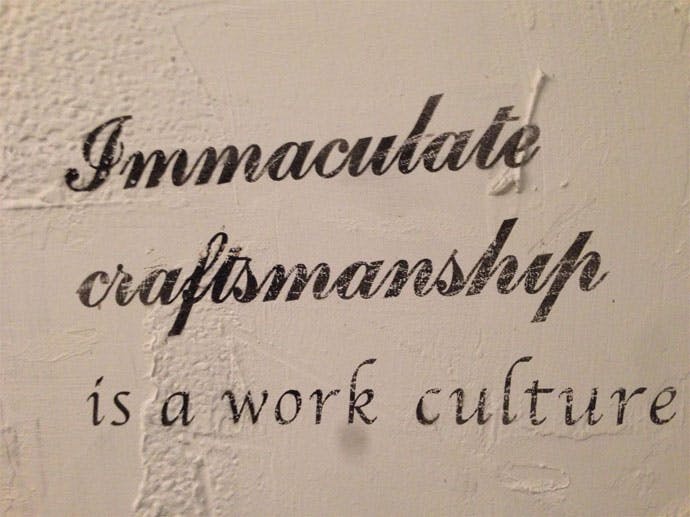How to Build a Great Business


When people ask what my long-term plan is for Help Scout, I always have a hard time answering the question. Am I supposed to talk about money? An exit? Maybe the roadmap?
The truth is, I don’t think any of those things are the measure of a great business. They don’t align with my motivations, nor do they align with why Denny, Jared and I started Help Scout in the first place.
What I end up saying sounds like a cop-out, but it’s the truth: I want to build a great business.
The goal isn’t to be wildly profitable, or to sell for a specific dollar amount. Maybe these things are byproducts, but what motivates me to go to work every day is striving to build a great business.
Try the customer support platform your team and customers will love
Teams using Help Scout are set up in minutes, twice as productive, and save up to 80% in annual support costs. Start a free trial to see what it can do for you.
Try for free
5 components of a great business
Of course, every entrepreneur has their own definition of what makes a business great. That’s what makes the journey so fun. For me, a great business:
Is a business people want to buy from
Has a culture employees are proud to be a part of
Champions its customers’ values
Raises the bar for those that come after it
Stands the test of time
One business I admire that has exceeded these standards is Patagonia. Their cult-like following (of which I am a card-carrying member) is well-deserved. Not only do they make world-class products, but they do so with an unparalleled commitment to the environment. They care so deeply about it in part because their customers do.
They’ve also set an incredible standard for culture. One example is Family Business, a self-published book about their 30+ year effort to support parents in the workplace.
And for good measure, Patagonia donated 100% of their sales on Black Friday, 2016 to grassroots organizations supporting the environment. Sales that day exceeded $10 million. In the minds of many, Patagonia is a truly great business, and their products are only a small part of what makes them great.
Establishing mission and values

I took the above photo several years ago in a small Hong Kong storefront. It reminds me that great products (and great businesses) are made thoughtfully and intentionally. It doesn’t happen by accident.
In the early years of a company, your mission and values form organically. Everyone knows them because they helped create them. But as your business grows, you have to be intentional about enforcing them.
Today, 50 people work at Help Scout. It takes a coordinated and proactive effort to make sure everyone knows our mission and values, understands why they exist, and feels empowered to apply them daily on behalf of the company. New hires don’t know these things about Help Scout on day one, so we make sure it's one of the first things they learn.
I know it sounds corporate and formal, but have you thought about writing down your company’s mission and values? Do you share them in detail with every new member who joins your team?
The companies I admire most are fanatical about this stuff. They write down their mission and values, and they construct a decision-making framework around them moving forward. We’ve only done this recently, but it’s making a difference. It’s a new year, and it could be a worthwhile exercise for your company to think about today.
Sustaining a great business
Right about now, I can guess what you’re thinking: Nick, what entrepreneur doesn’t want to build a great business? Obviously that’s the goal.
However, most businesses fail to be great in the long term, despite their best efforts. Remember, by my definition at least, a business isn’t great unless it can stand the test of time. And that’s the hardest thing for a company to do. So far, I think we’ve given Help Scout a chance at being great someday.
As a company matures, there are innumerable compromises to be made in favor of short-term growth or meeting the expectations of outside stakeholders. There will be times when you have to choose between growth and your values, between your own success and the success of everyone.
What I've learned is that the key to sustaining a great business is optionality.
When your company has options to fall back on, you can stay committed to your definition of greatness.
For instance, I’ve always positioned Help Scout so that we’d never be dependent on additional funding to sustain the business. We’ve raised money a couple of times, but in each case it was a choice. If the deal or the stakeholders asked us to compromise on the kind of company we wanted to build, we could walk away and be fine without their investment.
Funding the business this way has resulted in a different growth trajectory for Help Scout. But growth isn’t the goal, is it? The goal is to build a great business, and we’ve got to be in control of our own destiny to get there. I’ll happily trade growth for optionality any day.
Keep practicing
2017 marks the sixth year I’ve been working at Help Scout, and I still feel like we’re just getting started. The 5- or 10-year plan doesn’t really matter to me, but building something great sure does.
If you are or aspire to be building something great in 2017, it’s worth considering the following:
How do you define a great business?
What mission and values are critical to getting you there?
How can you structure your business so that you don’t ever have to compromise on the above?
Can you be incredibly happy in pursuit of this goal for 10, 20, or even 30 years?
I’m honored to work at Help Scout every day, with people who challenge me to be my best. I’ve always said I want this to be my last job, because building a great business is something I'm excited about. That’s something I hope we all want to strive for.
Help Scout For Good
If you’re making the world a better place, we’d like to help.
Learn MoreThe Supportive Weekly: A newsletter for people who want to deliver exceptional customer service.